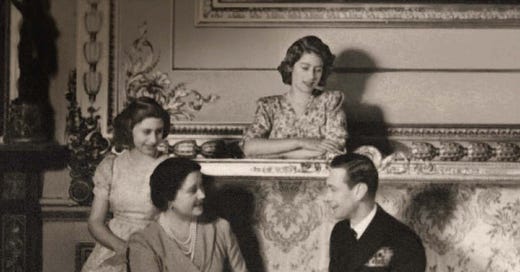A Spare Who Spared Himself Nothing
Sally Bedell Smith’s “George VI and Elizabeth: The Marriage That Saved the Monarchy” explores a wholly different epoch in the Windsor saga.
At the end of a busy publication week for George VI and Elizabeth: The Marriage That Saved the Monarchy, The New York Times posted an insightful and positive review that I’d like to share with my Royals Extra readers. I greatly appreciate your support in these first weeks of my newsletter and hope that those of you who aren’t paid subscribers will consider upgrading to receive exclusive posts.
“Smith’s lively account reminds readers that at its finest hour — whatever the historic sins or abiding iniquities of the British Empire itself — the crown managed to stand for selfless leadership, resilience and compassion for its people.”– NY Times
Book Review: ‘George VI and Elizabeth’ by Sally Bedell-Smith - The New York Times (nytimes.com)
Some more excerpts:
Smith avoids the murky waters of Megxit. Instead, she makes the refreshing choice to focus on an earlier Windsor “spare,” Bertie, Duke of York — the second son of George V — and his Scottish-born wife, née Elizabeth Bowes-Lyon. This pair, the parents of Elizabeth II, stand as an inspiring, if unlikely, counterpoint to their present-day descendants. The throne to which they unexpectedly acceded brought out their most, rather than their least, admirable traits: “qualities of duty and service,” as the author puts it, “in the most challenging circumstances.”
Yet Bertie did not, in contrast to his older brother, view the obligations of his high position as inseparable from its privileges. Reluctantly but bravely he committed, as he put it in a letter to [the former King Edward VIII], to “taking on a rocking throne and trying to make it steady again.” His wife — outwardly sweet but steely — was crucial to this effort: a tireless supporter of her husband, his primary confidante and a protective bastion of normalcy in a world gone mad.
George VI’s commitment to duty assumed heroic proportions with the outbreak of World War II, when England stood alone in Europe against the Nazi menace. Like their compatriots, he and his consort endured the hardships of wartime: bombings, blackouts, food shortages and separation from their daughters (who were dispatched to the relative safety of rural Windsor). With their stalwart presence in London throughout the Blitz, and their tireless visits to and palpable empathy for the individuals hit hardest by the German war machine, the royal couple earned the respect and affection of their subjects, who, according to one journalist, came to see them as friends “whom they know to be one with them not in heart only but also in experience and in toil.”
For their part, the king and queen found unexpected fulfillment in their effort to support their people and lead by example. When considering a group of Britons whose towns the Luftwaffe had razed, Elizabeth reflected: “If one can help those gallant people, everything is worthwhile.” Although she is said to have privately blamed the stress of the unexpected burden of kingship for her beloved husband’s premature death — and resented David and Wallis to the end of her very long days — this selfless ethos became her daughter Elizabeth II’s watchword and the key to her enduring popularity.




